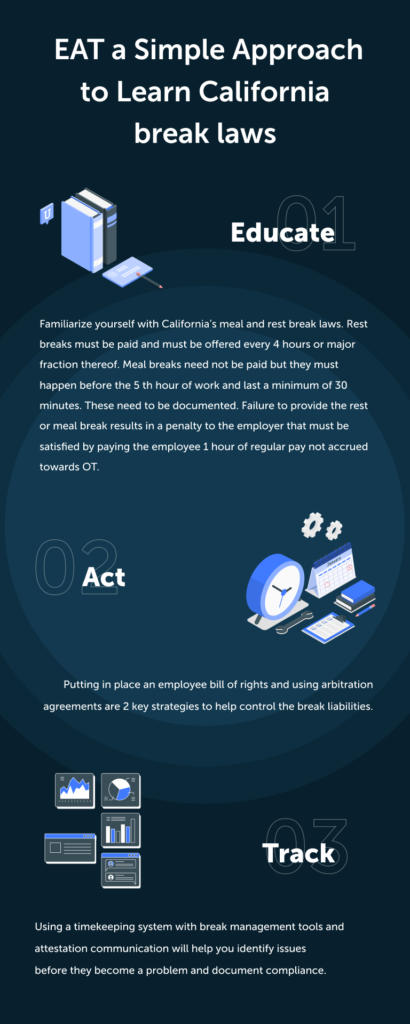The Comprehensive Guide to
California Break Laws
Our guide on California break laws, aiming to help you navigate the legal landscape and avoid potential issues. Understanding and following California break laws for employees is crucial to ensure compliance and avoid legal consequences. These laws grant employees the right to a minimum 30-minute (uninterrupted, duty free) meal period if they work more than five hours. These breaks need not be paid. Additionally employees are entitled to at least one paid ten-minute rest break(uninterrupted, duty free) every 4 hours or major fraction thereof. These breaks must be paid.
In this guide, we’ll explore Worksana’s user-friendly solutions, offering practical insights to help you handle California break laws effectively.
Believe it or not, a single missed meal can cost your business millions. Even crazier is the fact that this expense could be avoided if the meal break had been taken! Each week, approximately 150 companies in California are targeted by lawyers under PAGA. This is a bounty hunter law that deputizes private attorneys to act on behalf of the state. The State receives 75% of settlements collected. Employees get the rest less attorneys costs among other things. The most common reason employers will be involved in a PAGA lawsuit are violations of break laws.
The Comprehensive Guide to
California Break Laws
Understanding Meal break Management for California break laws for employees is as simple as remembering the word EAT! We recommend a three-step approach: Educate, Act, and Track.
01 Educate - Know Your Break Rights
Start with education. Equip yourself and your team with knowledge about labor rights related to breaks. Get familiar with California’s break language in the labor code, distinguishing between Rest Breaks and Meal Breaks.
- Rest Breaks must be provided every four hours of work or major fraction thereof, paid unless declined by the employee.
- Meal Breaks are mandatory before the end of the fifth hour of work and must last at least 30 minutes. These breaks may or may not be paid, and employees should punch out for documentation.
If breaks are not provided, employees must be compensated with one hour of premium pay at their regular rate, not calculated against overtime. This penalty, also known as a ‘premium,’ applies if breaks are interrupted and not duty-free.
Two simple practices within education are having an Employee Bill of Rights and an Arbitration Agreement. These practices provide clarity, ensuring comprehensive knowledge of employee rights and securing documentation
02 Act - Simplify with a a Time Management tool
Simplify your company’s operations with a Time Management tool like Worksana, for efficient break management.cIn the ‘Act’ section, focus on two key points: Timekeeping and Notification.
- Timekeeping: Use Worksana to document breaks effectively. Monitor employees’ working hours with ease, allowing them to clock in on any device.
- Notification: Proactively remind your employees about the importance of complying with break laws. Worksana’s automated reminders ensure everyone stays on track.
03 Track - Effortless Break Management
Use Worksana’s features for easy break management. Surveillance tools detect missed or delayed meal breaks, ensuring employees take necessary breaks. Survey documentation allows employees to explain reasons for missed breaks.

People also ask
Employees must receive a Rest Break every four hours of work or a significant portion thereof; these breaks are compensated unless the employee chooses otherwise. Meal Breaks are obligatory before the conclusion of the fifth hour of work and must extend for at least 30 minutes. Whether these breaks are paid or unpaid may vary, and employees are required to punch out to document their duration.
Employees are required to take meal breaks no later than the conclusion of their fifth hour of work, lasting a minimum of 30 minutes. These breaks, whether compensated or not, necessitate employees to clock out for proper record-keeping.
Rest breaks must be given every four hours of work or a significant portion thereof, with compensation unless the employee declines. Meal breaks are obligatory before the end of the fifth hour, lasting at least 30 minutes, and may or may not be compensated. Employees should clock out for documentation purposes. Failure to provide breaks warrants one hour of premium pay at the regular rate, not counted towards overtime, as compensation. This penalty, known as a ‘premium,’ applies if breaks are not provided or are interrupted with duties.
Download Rest Break Management Playbook
Learn about the important aspects of managing meal and rest breaks in California. This playbook covers everything you need to know to ensure compliance with state laws and regulations.
